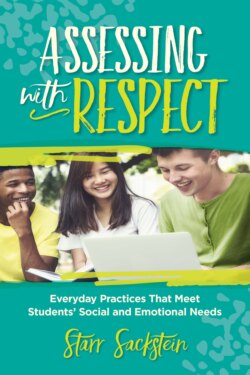Читать книгу Assessing with Respect - Starr Sackstein - Страница 24
На сайте Литреса книга снята с продажи.
Developing a Sense of Belonging and Honoring Differences
ОглавлениеAlthough the concept has been touched upon throughout this chapter, it is important to directly acknowledge and discuss the idea of "belonging." Equitable learning spaces ensure that all participants have what they need to be successful, honoring not only academic needs but also social and emotional ones.
In their book Belonging Through a Culture of Dignity, Floyd Cobb and John Krownapple (2019) define belonging as
the extent to which people feel appreciated, validated, accepted, and treated fairly within an environment (e.g., school, classroom, or work). When students feel that they belong, they aren't worried and distracted about being treated as a stereotype or a thin slice of their multidimensional identities (Willms, 2000). Instead, they are confident that they are seen as a human being, a person of value. Belonging isn't just a nice sentiment or a word on a Hallmark greeting card. It's a need that's hardwired into human beings. Like neglecting the need for food or water, neglecting belonging is hazardous to our health. In fact, it's lethal. (p. 43)
We should never ask students or teachers to omit a part of who they are so that they can be successful in our spaces. Instead, we need to find a way to embrace each person's identity and then use it for the benefit of the person and the shared space. This approach is especially applicable to the learning opportunities we provide for students. It is easy to create an assignment that may hit on particular content but doesn't allow for students to show everything they know on the topic; such an assignment could promote anxiety and frustration. Being aware of the needs of our learners helps us to develop assignments and assessment opportunities—whether they are projects or exams—that provide opportunities for voice and choice and support student success.
In my early career, before I had the teaching chops I needed to develop, I was fortunate to meet students who helped me become a better person. In my second year, I met a young woman whose background was quite different from mine. She was 17 years old, preparing for an arranged marriage, as was customary in her culture, and trying to come to terms with her sexuality. Of course, I didn't know most of that at the time. I just knew that she took refuge in my classroom, and when I needed a senior to volunteer to take control of the yearbook production, she responded.
We often had frank conversations about her family and her fears, and she often humored my incessant curiosity and tried to help me be less ignorant. I was quite young then, maybe 24, so we were almost the same age but living different lives. (We could have been friends at the time, and in fact, after she graduated we stayed in touch, and I would call her a friend now.) A closeness developed between us as she shared her art and her stories while we worked on the layout of the yearbook, and when she came out to me, I could only be supportive, knowing that her family wouldn't be.
Later she told me that few people had ever really listened to her and made her feel heard at that point in her life. My willingness to accept her as she was, without judgment, made it possible for her to speak her truth. I am grateful that I could be that person for her and hope that throughout the rest of my life I have the continued grace to see opportunities to build these kinds of relationships and help all feel that they belong, no matter what.
Another person who comes to mind is a young student who was designated male at birth but who identified as female. She came from a very religious family who would not accept her as a woman. She came to school each day and changed into the clothing she felt comfortable in; as a school, we sought to make her feel welcome and protected. Everyone treated her with respect and love, especially knowing the challenges she faced at home. When she was old enough to move out, the guidance counselor and I ensured she had a safe place to go and helped ensure she graduated so she could go on with her life beyond school.
I mention these stories because they illustrate that students need to feel safe before they can learn. When they feel like they belong, we strengthen their ability to feel empowered and further develop their sense of self. Later in this book, you will read about how traditional assessment practices and testing greatly diminish how students feel about themselves and their willingness to even participate in learning. Educational institutions have an obligation to develop students not only academically but also emotionally and socially; we can do that by ensuring a sense of belonging in the relationships we develop. The vignette that follows describes the experience of Jessica Cimini-Samuels, a middle school science teacher in New York City, in creating a safe place for students.
